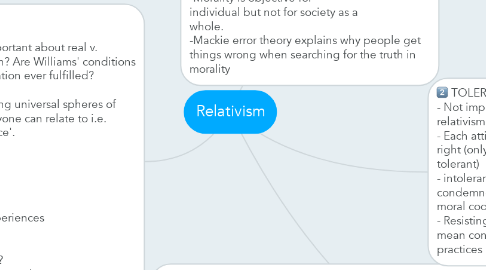Relativism
by Anna Bromely

1. RELATIVISM -All moral truths are relative to society (x is right = x is right according to moral code of society y) - Moral codes define moral truth (not reflection) -Morality as social invention (not discovery) -Not subjectivism (morality is a social one) -Pluralism and incommensurability are not relativism -Morality is objective for individual but not for society as a whole. -Mackie error theory explains why people get things wrong when searching for the truth in morality
2. Williams: The truth in relativism In response to the question: Is morality relative? True: Only applies to own social group. False: False: Objective moral truths. 1. Condition: Society 1 and Society 2 (need more that 1 society to get relativism going) are in some way exclusive of each other - conflicting consequences, therefore comparable - If incommensurable need to be a description of the consequences - 2 confrontations, real and notional. Real: Everyone everywhere makes judgements. When we get into real confrontation that relativism is false. Notional: Opposes this view. Thick ethical terms like shame, guilt, courage means relativism applies. Williams thinks that relativism is not all or nothing, there is a spectrum and can assess how good moral codes are.
3. Objection 1.P.Foot - What is important about real v. notional confrontation? Are Williams' conditions for notional confrontation ever fulfilled? 2. Nussbaum - Isolating universal spheres of experience that everyone can relate to i.e. 'grounding experience'. Reply 1. Is there a single answer? 2. Are grounding experiences universal? 3. Which grounding experiences are they? 4. Abstract values don't make an ethical practice which needs specificity.
4. TOLERATION - Not implied by relativism - Each attitude relative to that code is right (only tolerant societies ought be tolerant) - intolerance can only be condemned next to a societies own moral codes - Resisting relativism does not mean condemning different practices


